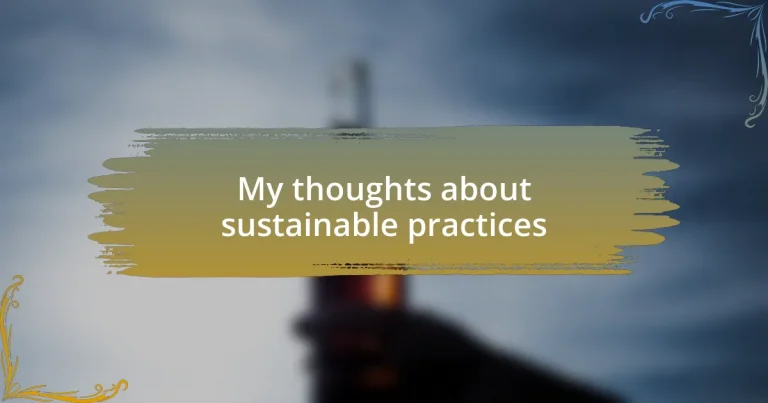Key takeaways:
- Sustainable practices in the alcohol industry involve ethical sourcing, renewable energy use, and community engagement, enhancing both product quality and environmental responsibility.
- Supporting local breweries and distilleries reduces carbon footprints and fosters connections with the community and its agricultural practices.
- Certifications like organic and Fair Trade help consumers identify products committed to sustainable and ethical practices.
- Innovative approaches, such as zero-waste practices and sustainable packaging, contribute significantly to reducing environmental impact in alcohol production.
Author: Clara Whitmore
Bio: Clara Whitmore is an acclaimed author and storyteller known for her captivating narratives and richly drawn characters. Her work spans several genres, including contemporary fiction and historical romance, often weaving elements of personal experience into her writing. Clara holds a Master’s degree in Creative Writing from the University of Edinburgh and has published three novels, which have garnered critical acclaim and a loyal readership. When she’s not writing, Clara enjoys exploring quaint bookstores and hosting literary workshops. She currently resides in Portland, Oregon, with her dog, Jasper.
Understanding sustainable practices
Sustainable practices are all about creating a balance between enjoying the products we love, like alcohol, and protecting our planet. I remember the first time I noticed the impact of a local brewery that sourced its ingredients from sustainable farms; it opened my eyes to how our choices can support eco-friendly methods. How often do we consider the journey our drinks take, from the field to our glass?
Every small step towards sustainability counts, whether it’s choosing organic wines or supporting distilleries that use renewable energy. I once visited a vineyard that implemented rainwater harvesting; seeing their commitment left me feeling optimistic about the future of our drinking culture. Can we really overlook the profound connection between what we consume and the health of our environment?
Understanding sustainable practices isn’t just about regulations or certifications—it’s also about our personal values. Each time I decide to buy from brands focused on ethical production, I feel more aligned with my beliefs. Wouldn’t it be empowering to know that every sip contributes to a healthier planet? This mindset shift can truly reshape our relationship with alcohol.
Overview of sustainable alcohol brands
When it comes to sustainable alcohol brands, a few names consistently stand out due to their commitment to eco-friendly practices. For instance, one brand that I admire has shifted to biodynamic farming, ensuring every ingredient is not only organic but also follows the natural rhythms of the earth. I once tasted their wine during an outdoor event, and it struck me how the flavor reflected the care they put into their production. Isn’t it fascinating how thoughtful farming can elevate the drinking experience?
I’ve noticed that several distilleries are now incorporating zero-waste practices by reusing their by-products in innovative ways. For example, a whiskey distillery I visited uses spent grains to create artisan bread—a delicious result of sustainability! This brings me to wonder: how many other brands could benefit from such creativity? It’s a compelling example of how businesses can think outside the box to reduce waste while offering something special.
Many sustainable brands also prioritize transparency, sharing their sourcing and production processes with eager consumers. I remember visiting a local cider company that openly discussed their environmental initiatives, which made me feel connected to their mission. Wouldn’t it be great if more alcohol brands followed suit, allowing us to make informed choices that align with our values? This level of engagement not only builds trust but also fosters a community united by shared ideals around sustainability.
Evaluating sustainable practices in production
When evaluating sustainable practices in production, I often look for brands that actively involve their communities. A winery I visited recently goes beyond just its vineyard; they engage local farmers in sourcing ingredients, which not only supports the local economy but also fosters a sense of collaboration. Don’t you think it’s powerful when a brand builds relationships that touch the lives of those around them?
Another aspect worth considering is energy use during the production process. I recall seeing a distillery that invested in solar panels to power its operations. The owner shared how this transition significantly reduced their carbon footprint while lowering energy costs. It’s incredible how a simple switch like this can have a profound impact. What might other producers achieve by following their lead?
Lastly, I appreciate brands that insist on responsible sourcing. There’s something deeply reassuring about choosing a spirit that comes from ingredients harvested with care for the environment. I once sampled a gin made from foraged botanicals, and the unique flavors were a testament to the thoughtful sourcing approach. How often do we stop to think about where our drinks originate? Understanding this can transform our drinking choices into meaningful connections with nature and the artisans behind the product.
Personal experiences with sustainable drinks
During my journey into sustainable drinks, I’ve stumbled upon some truly memorable experiences. One evening, I joined friends at a local bar that featured a selection of organic wines. I could feel the energy in the room change as we learned about the vineyards’ organic farming practices. Each sip felt like a nod to nature and a step away from synthetic additives. Isn’t it refreshing to taste something so pure?
On another occasion, I attended a tasting event that highlighted small-batch spirits made from locally sourced ingredients. The distiller passionately shared stories about each ingredient, and I remember being captivated by the way they honored the land. I took a sip of their small-batch bourbon and was surprised by the depth of flavor. Can a drink truly embody the spirit of a place? In that moment, I felt a connection to the landscape and community in a way that mass-produced spirits never could.
What really stands out to me is how sustainable choices can enhance our drinking experiences. I once sipped a craft beer brewed from water reclaimed from the brewing process. Initially, I was hesitant, but the taste was phenomenal and I marveled at the win-win of brewing with care for both flavor and environment. Have you ever thought about how the story behind your drink can elevate the experience? It’s moments like these that remind me why seeking out sustainable options can be so rewarding.
Recommendations for choosing sustainable products
When choosing sustainable products, I always recommend looking for certifications such as organic or Fair Trade. These labels aren’t just marketing gimmicks; they signify a commitment to ethical farming and production practices. I once selected a vodka that boasted a Fair Trade certification, and the flavor profile was absolutely exceptional. Isn’t it comforting to enjoy a drink that supports both the environment and the communities behind it?
Another strategy I use is to explore local producers. Supporting local businesses reduces carbon footprints associated with transportation and often gets you fresher products. I recall visiting a distillery just a few miles from my home where they sourced everything from nearby farms. Not only did the spirits have a distinct flavor rooted in the local terroir, but I also felt a connection to the place and its people. Have you ever tried a drink that made you appreciate your surroundings more?
Lastly, I pay attention to packaging. It’s easy to overlook, but sustainable packaging can make a significant difference. When I found a wine that came in a recycled bottle with minimal plastic, not only did I appreciate the thoughtfulness behind it, but I felt like I was part of a movement towards reducing waste. Have you considered how your drink’s packaging could impact the planet? Each small choice adds up, and recognizing these details can enhance both our choices and our drinking experiences.


